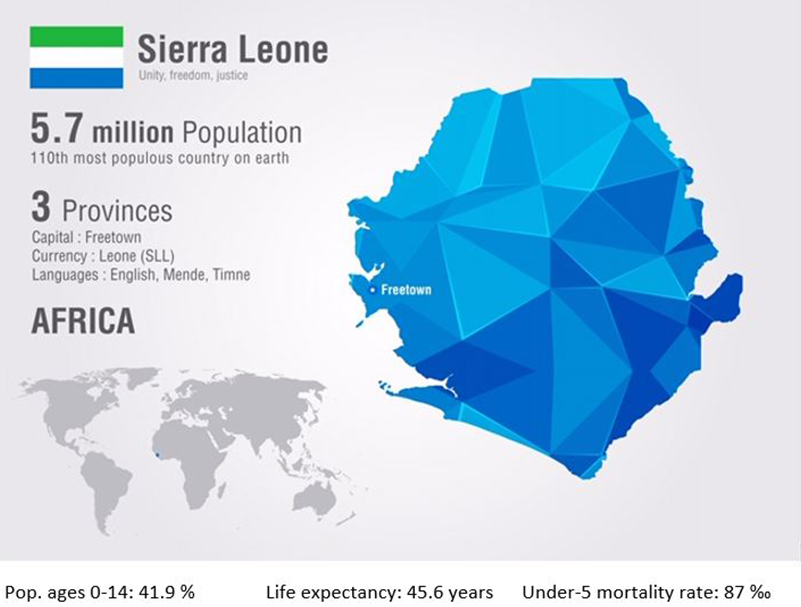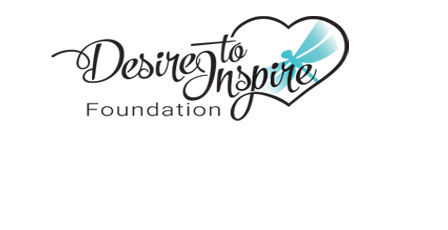Sierra Leone

Sierra Leone is located in West-Central Africa, on the coast of the Atlantic Ocean. It has a warm, tropical climate and is located just north of the equator. It is a constitutional republic with a directly elected president and a directly elected 132 members of a unicameral legislature known as Parliament. Sierra Leone is made up of five administrative regions. These regions are subdivided into sixteen districts. Each district has its own directly elected local government, though with very limited powers, as most of the powers are held by the central government in Freetown. Freetown (population 1,050,301), located in the Western Area, is Sierra Leone’s capital and largest city.
From 1991 to 2002, the Sierra Leone Civil War was fought and devastated the country. The proxy war left more than 50,000 people dead, much of the country’s infrastructure destroyed and over two million Sierra Leoneans displaced as refugees in neighbouring countries. In January 2002, President Ahmad Tejan Kabbah fulfilled his campaign promise by ending the civil war, with the help of the British government, the Economic Community of West African States (ECOWAS) and the United Nations. More recently, the 2014 Ebola outbreak overburdened the weak healthcare infrastructure, leading to more deaths from medical neglect than Ebola itself. It created a humanitarian crisis situation and heavily impacted economic growth.
Although the English language is the official language spoken at schools and government administration, the Krio language, an English-based creole, is the most widely spoken language across Sierra Leone and is spoken by 97% of the country’s population. The Krio language unites all the different ethnic groups in the country, especially in their trade and social interaction with each other.
Torn apart by decades of an extremely destructive civil war, Sierra Leone is struggling to escape the bloody mess in which she finds herself. The cry for children’s rights, many a time violated during the war, has even today yet to make itself heard.
Poverty
Sierra Leone numbers among the poorest countries in the world. 70% of its population lives below the poverty line. The gross national income of its inhabitants is more than 100 times lower than that of Italy’s inhabitants. Such an economic situation has a profound effect on rights which the International Convention of Children’s Rights seeks to guarantee.
Right to Health
The healthcare situation in Sierra Leone is especially grave and deplorable. The infant mortality rate is the fifth highest in the world and life expectancy is extremely low.
Hopes are high for the future, however, owing to recent reforms in the system and the government prioritization of such reforms. Medical care has become free for pregnant women and children under the age of 5.
However, further development of health services is required if such services are to effectively meet the needs of the population.
Too often, benign health problems become a matter of life and death. This is usually due to a lack of preventative measures, and poor hygiene.
Furthermore, health and medical establishments are unable to guarantee even the most basic quality of care.
Female genital mutilation
Female genital mutilation is still practiced in certain regions of Sierra Leone. One estimate is that more than 30% of young girls have been subjected to this particular operation.
The procedure is dangerous and dirty and can have serious consequences for the health of the young girls involved. Infections, hemorrhages, and other problems are not uncommon.
Right to Education
Nearly 30% of children in Sierra Leone are uneducated.
After years of civil war which led to the closing of many educational establishments, there has been some improvement in school accessibility.
Even so, it remains very difficult for certain children to go to school, particularly in remote regions of the country.
School buildings are dilapidated and the teachers are by and large unqualified. What is more, a large number of children are forced to work to support their needs—a situation that invariably has a detrimental effect on their education.
Child Soldiers
The armed conflicts that have occurred in Sierra Leone have had a significant and altogether negative impact on the lives of children. Children have in effect been recruited by armed groups that kidnap them at an early age and force them to live under the most atrocious conditions.
Young girls are abducted and raped, while the boys are forced to become soldiers. On orders from their chiefs, they are forced to kill and massacre entire families.
Reintegrating these children into civil life is a very complicated affair. Certain centers have been established to help them to do so. However, because they have known only violence and cruelty over the years, it is difficult for them to return to a normal life.
Child Labour
In Sierra Leone, nearly one out of every two children are obliged to work in order to help support the needs of their family. Some find work as domestics; thousands of others, however, end up working under extremely dangerous conditions and sometimes die as a result. Examples include child miners and field laborers among others.
If by chance they escape, these children nevertheless bear scars and frequently suffer from physical and psychological problems.
Child abuse
Domestic violence remains a problem in Sierra Leone, particularly with regard to young girls. Many are beaten at home and sometimes raped. Abuse is rarely reported and even when it is, nothing tends to come of it.
Nor is child abuse simply a family problem. Young girls are known to be abused by their teachers. The physical and psychological trauma that ensues is extremely harsh. Unwanted pregnancies sometimes result, thereby posing yet another threat to the lives of these young girls.
Child Marriage
In Sierra Leone, the minimum age for getting married is 18. Nevertheless, nearly one out of every two girls is married before the age of 18. They are prepared early on for their future situation as wives. However, these marriages often have grave consequences for the health of these young girls who do not understand what will ultimately be demanded of them.
Right to Identity
In Sierra Leone, 50% of births are not registered with the proper authorities. As a result, many children have neither an official identity nor a nationality.
This invariably leads to even greater problems for the people who lack these things. Since they do not officially exist, they will remain invisible in the eyes of society and be unable to exercise their rights.
Our Families
Save the Young Girls Foundation Waterloo, Sierra Leone
Number of children
Greatest Challenges: Food, Basic Medical Care
In collaboration with Empower Sierra Leone
Their mission is to empower young girls to grow up to be self-sustainable, confident women. These girls often have a rough start in life. We exist to be a safe-haven for them to come to in time of need, to be able to get food and shelter if needed, and to help be available for after-school programs. We teach our girls self-respect and confidence and cannot wait to see them grow up to be successful, powerful women!
Our Impact: Moved children from one room home on Rokupa Wharf where the 31 girls slept on the floor to a home with beds in Waterloo. Provided food, housing, and basic medical.
Rokupa Wharf clean-up project
How many people live on the wharf?

